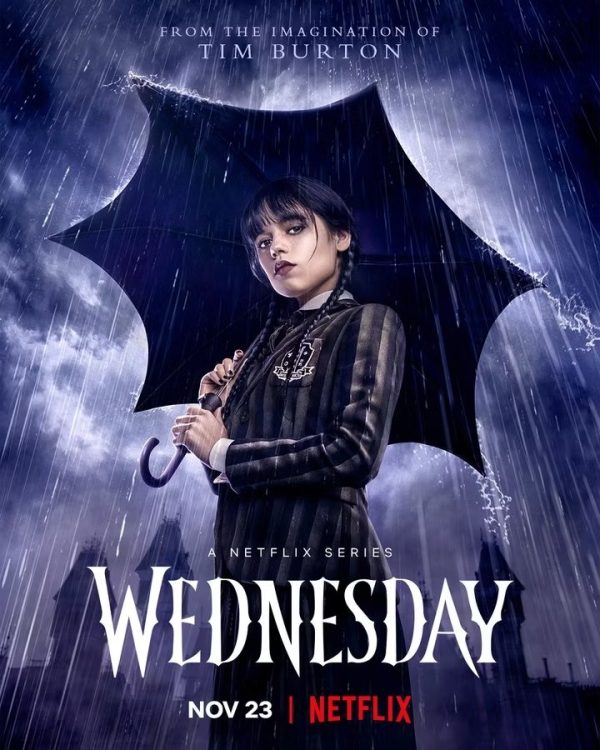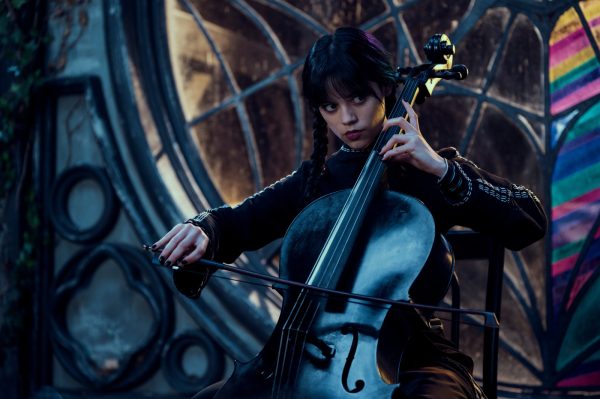Shaun Munro reviews the first season of Netflix’s The Addams Family spinoff series Wednesday…
As streaming services continue their industrious quest to plumb every last viable “IP” ripe for its own series treatment, in the very least a contemporary live-action adaptation of The Addams Family feels like a fairly natural eventuality. After all, little truly worthwhile has been done with the property since Barry Sonnenfeld’s two fantastic 1990s movies, and if Wednesday can put better paid to the iconic characters than the forgettable recent animated films, why the hell not?
Wednesday takes place in the present day and focuses on a 15-year-old Wednesday Addams (Jenna Ortega) after she’s expelled from her high school for viciously attacking a bully with a fleet of piranha. Wednesday then ends up at Nevermore Academy; an elite boarding school that caters to outcasts and the supernaturally inclined. That is to say, it’s the very educational institution where Wednesday’s parents Gomez (Luis Guzmán) and Morticia (Catherine Zeta-Jones) met.
But just as Wednesday begins settling in, it transpires that an unknown force is in the midst of a murderous rampage across the sleepy, depressed nearby town of Jericho, and as the light of suspicion is shone on Wednesday and her family, she seeks to identify the killer to clear their name and prevent a prophesised cataclysm at Nevermore.
It’d surely be unfair to relentlessly compare Netflix’s long-form take on The Addams Family to the much-loved Sonnenfeld films – especially as the focus here is trained so intently on just one member of the clan – but it’s nevertheless difficult not to. Tonally, it certainly draws from a similar template, with the bevy of amusingly deadpan one-liners spouted by the title character, and general tenor of gallows humour cutting throughout. But while the films maintained a cartoonish sense of brutality, this series is more explicitly violent, with a few gnarly kills easily crossing the PG-13 threshold.
Wednesday is also more overtly supernatural, appearing to unfold within a universe where fantastical derring-do is basically just accepted. Yet some creative decisions in this regard feel tailor-made to divide fans and purists, especially the choice to bestow Wednesday with a vague ability allowing her to witness ambiguous visions of the past and future alike. Some will inevitably see it as a lazy narrative device intended to unfurl exposition in visual terms.
The series also generally ventures in a far more heightened, at times almost superhero-esque direction; of course, Wednesday is a skilled martial artist in this iteration, if at least hilariously having been trained by her Uncle Fester (Fred Armisen). It smacks of a general desire to contemporise the Addams, the mileage of which will surely vary wildly among viewers. References to social media meanwhile induce temporary embarrassment, but at least Wednesday has the good sense to call it “a soul-sucking void of misinformation” and doesn’t even have a phone of her own.
With the show’s eight-episode, six-hour format, there’s an unsurprising effort to flesh-out the Addams family’s past, yet the attempts to mythologise them – venturing back hundreds of years to consider their ancestors – ultimately lack much in the way of interest or even mordant amusement. Did many fans of these characters really feel like they needed a deep dive into their forebears? The writing also proves languorous when unspooling an extensive backstory pertaining to the nearby town of Jericho and its own sordid history, mixed together with a glut of subplots of typically meandering interest.
Yet sure to be the single most divisive aspect of Wednesday is the decision to pare the expected gothic stylings down in favour of cloyingly dull YA melodrama. Melding high school hijinks with a love triangle subplot – where two boys vie for Wednesday’s chilly affection – and a staid supernatural murder-mystery narrative ensures this smacks of both CW teen dramas like Riverdale and Netflix’s own Chilling Adventures of Sabrina reboot. And even if you can tolerate how thoroughly extra it all is, the central enigma itself is so hilariously predictable – and yet so thoroughly slow-bled – that you’ll probably assume a fake-out is coming. It doesn’t.
And so with eight episodes – each containing the word “woe” in the title – clocking in at around 45-50 minutes a-piece, one can quickly feel the show straining under its own weight as it struggles to tell an expansive story worthy of this larger canvas. Yet this is a textbook example of streaming TV bloat; every single episode feels at least 10-15 minutes too long, and so a half-hour format would’ve probably worked better. The YA-ness of it all otherwise becomes exhausting, especially if you dare to binge it, channelling so much energy into a tone and storytelling trajectory sure to leave many fans cold.
But this isn’t to say there aren’t flecks of real promise, such as periodic splashes of satire re: the state of modern America, where public schools are underfunded and the livelihood of an entire town is reliant on the operations of a wealthy boarding school. The first episode also suggests far more of a Heathers-esque takedown of catty high school culture and student politics, yet surprisingly little is done with this despite the potential of the various student factions – vampires, wolves, sirens, and gorgons – coming to blows. Much like The Addams Family Values it can’t resist the urge to thumb its nose at America’s own whitewashed history, though ultimately can’t hold a candle to Christina Ricci’s Wednesday laying waste to a summer camp with her outcast friends in that film.
These issues aren’t for a lack of talent in front of and behind the camera, though; executive producer Tim Burton directed the first half of the season and hasn’t seemed this awake as a filmmaker in many years. He’s clearly working with material he has a fondness for, which tracks given that he was originally offered the 1991 film and later developed an unmade 3D stop-motion animated Addams Family film.

Yet the glaring MVP of Wednesday is unquestionably lead Jenna Ortega, who has extremely tough and very, very weird shoes to fill, following Christina Ricci’s inimitable lead. Yet Ortega’s consistently deadpan performance has a welcome continuity with Ricci’s – not that they cohere chronologically – between both her spiky line readings and abundance of eyeball acting. That’s not to say Ortega’s Wednesday is entirely severe; her herky-jerky dance routine to The Cramps’ “Goo Goo Muck” during a school dance is delightfully kooky, for one. But as great as Ortega is here, it’s hard to shake the feeling that she’s deserving of considerably stronger material.
Ortega isn’t alone in outclassing the script, though; Fred Armisen rocks up for a single episode as Uncle Fester, giving a much pluckier, goofier performance in the role than Christopher Lloyd did three decades ago, and providing a welcome – if temporary – diversion from the syrupy teen drama. Yet the member of the Addams clan who most benefits from the show’s larger canvas is surely Thing (Victor Dorobantu), who steals most all of the many scenes he’s in by way of his physical, obviously wordless expressiveness, whether flipping the bird or effectively acting as Wednesday’s hired muscle. His portrayal here might even surpass that of the Sonnenfeld films.
As for Wednesday’s parents, Catherine Zeta-Jones brings a sexy pallor to Morticia and sensibly doesn’t attempt an Anjelica Huston impression, instead adopting a breathy, husky voice and considerably more revealing, plunging neckline. Yes, husband and wife are still a prevailingly horny pair in this version, even if the chemistry between Zeta-Jones and Luis Guzmán can’t match the fiery intensity of Huston and Raul Julia.
It’s again probably an unfair comparison, though, given that Gomez and Morticia’s roles are incredibly small despite their prominent presence in the show’s marketing, appearing in just two episodes. Zeta-Jones gets a ripe opportunity to deliver a mesmerising monologue in one scene, yet Guzmán sadly isn’t given much interesting to do. As for the rest of the family, Pugsley (Isaac Ordonez) is basically an afterthought, but he gets considerably more screen time than Lurch (George Burcea), who barely qualifies as a character.
Though the cast of supporting characters at Nevermore mostly feel like thin sketches, there are a few notable standouts; Gwendoline Christie is a campy hoot as the towering Principal Weems, while Emma Myers is a blast as Wednesday’s infectiously peppy roommate Enid, who is struggling to “come out” as a werewolf. It’d also be remiss not to mention Christina Ricci, who appears as one of Nevermore’s teachers, Ms. Thornhill. The writers thankfully don’t get too wink-wink cute with her casting, but her presence is surprisingly abundant throughout the season, and ensures a neat passing of the torch from one Wednesday to the next.
This is certainly a well-made production – and, curiously, was filmed in Romania – yet ultimately can’t measure up to the pervasively gothic stylings of the Sonnenfeld films. But Danny Elfman – who composed the show’s theme – and general composer Chris Bacon deserve a measure of credit for producing a score that largely strikes out on its own without simply rehashing the iconic Addams Family leitmotif. The caustic new electronic title tune makes the snazzy opening titles pop, and Bacon’s score culminates in a gorgeous string cover of Metallica’s “Nothing Else Matters” during one pivotal, climatic scene.
But Wednesday is a messy stew if there ever was one; it fails to fully reconcile its tone, wavering between brutal violence and weird sex jokes, teen melodrama, and the source material’s own distinctly oddball vibe. It’s a shame that the central story is itself not terribly interesting, and the setup for season two a damp squib, but hopefully the narrative might at least prove more concise next time, while introducing more iconic characters from the franchise (namely, Cousin Itt). It’s just a shame the show likely won’t deviate from the YA quagmire it’s so aggressively immersed itself in throughout its first volume.
Even Jenna Ortega’s strong performance can only do so much to prop up Wednesday’s generic YA treatment, which only occasionally captures the rich wit and seductively gothic style of the Barry Sonnenfeld films.
Shaun Munro – Follow me on Twitter for more TV rambling.


















